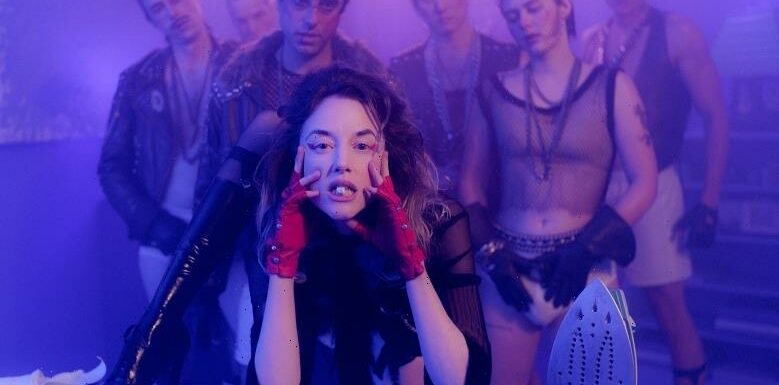
She’s stung in satire, chilled in horror, and charmed in comedy, but you’ve never seen Andrea Riseborough eat quite like this. Fusing each of these considered genres into one madcap mash-up, the British actress and producer kicks up her heels in “Please Baby Please,” a visually audacious camp exploration of gender and repression set in a dystopian 1950s New York. From the inventive mind of queer experimental filmmaker Amanda Kramer, “Please Baby Please” feels like John Waters and Peter Greenaway got together to remake Robert Wise’s “West Side Story.”
If that sounds like a lot, it is, but Kramer mostly pulls it off. Conceptually precise and visually daring, “Please Baby Please” is an impressive invention built on hyper-stylized performances and production. Unfortunately, it relies far too heavily on these elements — in place of story, character, and even comedy. Though Riseborough is clearly having the time of her life butching it up with her guttural groans, only the brilliant Cole Escola seems to understand the film should have been a comedy.
A fluid comedic performer whose arched brow could cut a rug, Escola brings some much-needed levity to Kramer’s somber urban hellscape. They are bitingly flirtatious in red silk as Billy, ragging on the square main couple as they cower in the gay bar. An adept cabaret performer, they sing a haunting reverie to lost love in a phone booth, and not even flower-dotted eyelids can upstage their plaintive croon. Though Escola always shines (and scene-steals) as a supporting act, Kramer seems to have missed her very own Divine right in front of her.
Instead, Riseborough is the main event as rebellious beatnik housewife Suze. Plain but striving for more, she hosts poetry readings in the brown shag apartment she shares with her meek husband Arthur, played by the pleasingly unusual Harry Melling (“The Queen’s Gambit”). One night on their way home, they are spooked by a gang of hunky greasers who go by The Young Gents, as emblazoned on their studded leather jackets. Once Arthur lays eyes on dangerously beautiful ringleader Teddy (Karl Glusman), unlocking his latent queer desire, it sets the couple through the looking glass of gender and creative expression.
Demi Moore in “Please Baby Please”
Music Box Films
While Arthur’s journey seems clear from the jump, Suze’s unfolds more slyly. It begins with an eye-opening encounter with a sultry upstairs neighbor, delivered in a delightfully surprising guest appearance by Demi Moore. Draped in cheetah print silks and an off-kilter wig, she lures Suze up to her baby blue apartment, where her impressive collection of appliances (which she calls “vibrators”) sets off distant alarm bells of domestic liberation. “These are the slums, and I’m a slum starlet,” she proclaims with an arch deadpan, heralding a glimmer of another act for the star.
Despite all the symbolically ripe visuals and tonal sirens blaring loud and clear, Kramer’s script is oddly on the nose at times. While the thin narrative is mostly obscured in riddles and playfully sexified slang, the characters often deliver stilted diatribes on gender roles that say too much while saying very little. “Men are the executors of history,” Suze decrees bitterly. “They instigate. They disrupt. They fuck.” “The world of men is one of comparison and measurement,” Arthur says to signal his inner turmoil. “Am I enough of a man?”
Though it’s clear Suze and Arthur yearn to break free of rigid gender roles, it’s hard to care about them when their humanity is obscured beneath so many layers of irony and satire. It may be great fun to drape gorgeous actors in leather and lace, bubbling out silly proclamations like, “That’s what a girl does, she makes a pretty poodle out of a salty dog,” but they have to want something.
When Edith Massey declares her love for The Egg Man in “Pink Flamingos,” we feel the humanity in her desire despite the outrageous surroundings. Beneath the filth and the baby crib and the hard-boiled eggs, there is something real in her unbridled joy. This is one reason why John Waters’ films have stood the test of time — there is meaning in the madness.
With its bisexual lighting and hyper-designed oddball aesthetic, “Please Baby Please” looks a lot more polished than its messier camp influences. Aesthetically, the film cobbles together its many cinematic influences with admirable swagger. But film isn’t solely a visual medium — it’s a storytelling one as well.
Grade: C+
“Please Baby Please” is now in theaters from Music Box Films.
Source: Read Full Article

